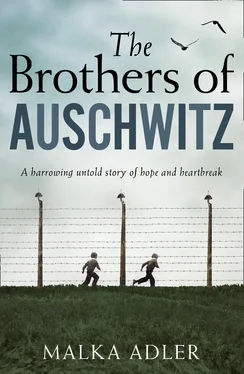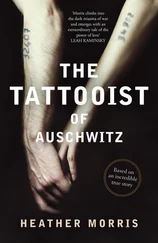Finally they put us on a side train with open cars. I realized that the Germans were looking for an alternative crematorium. We were good for nothing but gas and burning.
The ice consumed us in the open car, sticking us to the floor. We lay on one another like a pile of wet rags. The clothes I was wearing disintegrated at the seams. The shoes too. I pulled some string out of my pocket and tied the sole to my foot, even though I knew the shoe wouldn’t fall off because it was stuck to my foot by the scabs of my sores. Snow fell and fell, mixing with snot, vomit, and blood, it was colorful and shiny, like decorations in the sukkah our neighbor made every year for her and her husband because the children had gone to America and they were left alone and wretched. Those neighbors from the farm had also been on the ramp for a long time, also on the floor of the cars, yes, yes.
We traveled from Zeiss as if in a clean, white sheet, it was only disgusting and stank inside.
The train slowly slowly entered Schwandorf.
Again came the whining of planes and boom, a bombing. The Germans jumped down to find shelter. Some of the prisoners jumped after them, me among them. We rushed about like hungry mice in a burning house. We looked for food. We ran from door to door. Building to building. We didn’t find anything. We came to the window of a rather dark cellar the size of a largish room. The cellar floor was filled with closed suitcases. The window was narrow and barred. I stood next to the window with a group as finished as I was, but of all of them I was the smallest and thinnest. Prisoners standing next to me looked at me. At the suitcases. At me. At the suitcases. I understood. I was most afraid of death by gas, least afraid of dying from bullets or bombs. I grasped the bars and put my leg inside. Slid my body in. Passed in my other leg and hung in the air. One two, boom, I jumped. I landed on a full, brown suitcase. I opened it quickly. Shook out clothes, threw aside silver dishes, books, pictures, dolls, sweaters, glasses, slippers, shoe-laces, toiletries, didn’t find any food. I opened another suitcase. Looked in coat pockets, dug into the sides, found nothing. Tossed everything out of a third suitcase. Fourth. Fifth. The prisoners guarded me from above. Didn’t make a sound. I turned out tens of suitcases, nothing.
I wanted to get out.
The distance from the cellar floor to the window looked scary. A prisoner above called to me, put one suitcase on another and climb up. The prisoner’s voice was like my father’s. The voice of someone who knows things. I threw clothes into several suitcases, shut them quickly and stood one on top the other like a tower. I climbed up onto the pile. The suitcases sank under my feet. I fell down. The prisoner yelled to me, the bombing is over, hurry, hurry. I felt a dryness in my throat. I felt my legs melting like butter in the sun. I looked for solid objects among the belongings. I shoved books and silver objects on top of the clothes. I made a taller pile. Climbed up carefully. My body rocked, my legs trembled, I straightened up very slowly, raised my head. I heard my father’s voice, Yitzhak, jump, jump. Thin pale hands slid in through the bars. Skinny fingers signaled to me to come, to jump. Slowly, slowly, I raised my hands. I was far from them. The prisoner called in alarm, jump, jump. I jumped. Fell to the floor.
The sharp siren of a train paralyzed my entire body. I wanted to get up. My body was as heavy as a sack of flour. I knew, if I couldn’t get up, I’d die like a miserable rat in that cellar. I raised my head and screamed to the prisoners above me, I can’t die here like this, noooo! Help me to get out, I have to get out of here. The prisoners above knocked on the bars. I saw white fingers pressing on the bars. I leaned against a suitcase and pulled myself up. The cellar door was in front of me at the top of stairs. I ran to the door and pressed the handle. Locked. I’d forgotten, we’d tried to open it from above. I banged on my head like a madman, shouted, Yitzhak, think, think, otherwise you’ll rot here among the suitcases of the dead. Father’s voice called to me: Go back to the suitcases. Try, quickly, SSman coming. I’m waiting for you.
I felt stronger.
I took a deep breath. Wiped my wet hands on my shirt. Looked for the largest suitcases in the pile. Stood one on top of the other in a straight line. Climbed carefully, slowly straightening up, slowly. I barely moved. From above I heard, Yitzhak, jump, jump. I bent my knees slightly. Gathered momentum and jumped in the direction of the bars. Two hands held me fast, God, where did he get the strength, I heard Father’s voice breathing heavily from above, hold fast, hold, I’m pulling you out, hold, several more hands grasped me, and pulled, and pulled, I pushed my feet against the wall, I felt my arms were ripping from my body, my head fell back and I didn’t have a chance.
The prisoners didn’t let go. I reached the bars, got out and heard another siren and heavy wheezing from the direction of the train engine. SSman with a rifle approached the window and found nothing. The prisoners dispersed like hay in the wind.
I ran to the nearest car.
I managed to climb up. The open train left the station as the snow stopped falling. A cold wind whistled in my ears, I was hot. I gathered a fistful of snow from the floor and wiped my face. Until Buchenwald I vomited stomach juices. Until Buchenwald my knees shook and I heard that father’s voice, Yitzhak, jump. During all the days in the camps I’d hear, Yitzhak, jump. To this day I still hear it in my ears, Yitzhak, jump, jump.
Dov: Many people wanted me to tell them
what happened but I didn’t want to.
I only want to tell good things.
No one will believe the bad things
I went through; no one will believe me
because it isn’t normal.
Yitzhak: I don’t even want to remember.
The hunger at Camp Jaworzno ate me up from inside. I felt the end coming.
The food they gave us didn’t help. In the morning we were given coffee and nothing else. At noon, soup with worms. In the evening, a piece of bread, with a bit of margarine or cheese. That’s it. I felt like a creased sack with all the air punched out of it – Pachchch. I saw prisoners scratching the wall and eating filth. I saw people eating dust. They opened and closed their mouths as if they were chewing something. I did the same and thick saliva began to leak, like snot. One prisoner ran to the end of the bloc, stuck to the door and began to devour the wood. A blow to his head saved the door.
There were prisoners who didn’t get up for morning parade. They were gone before evening. There were prisoners who jumped on the fence. Some laid their bodies on the fence as if it were a bed, their faces to the stars. There were those who tied a rope around their necks and hanged themselves like clean washing from a beam. Not one prisoner in the bloc attempted to stop them. I didn’t know where they got the strength to commit suicide. I continued to stand on parade because I couldn’t think of another plan. I was a boy. I was a head shorter than most of the prisoners. I had sores on my hands, knee, and neck. The bones of my ass hurt, the lice were relentless, settled in a red mark full of scratches, and I continued to walk in the convoys.
One day we were standing in line before darkness fell. I was the last in the line to go back to the camp. A white sun disappeared behind clouds with swollen bumps like pointed stones in cotton wool. It was cold and stinking. Everyone dragged their feet from the trenches to the convoy. They left blurred, crooked tracks under their feet. Their shoulders slumped forward, almost falling apart at the arms. Everyone was silent, their faces on the ground. We’d barely started out in the direction of the camp when three were left on the road. Those who were leaking from behind were finished off first.
Читать дальше












